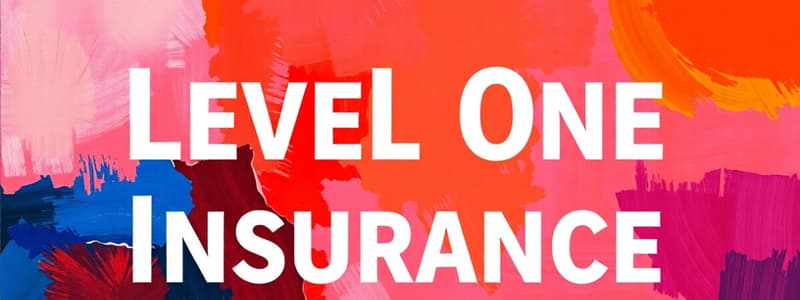Podcast
Questions and Answers
What should primarily drive the design of Level One insurance coverage?
What should primarily drive the design of Level One insurance coverage?
- Risk assessment (correct)
- Historical performance
- Public opinion
- Marketing strategies
Which of the following is a critical factor to consider when selecting Level One insurance?
Which of the following is a critical factor to consider when selecting Level One insurance?
- Popularity of the provider
- Personal preferences
- Policy terms and conditions (correct)
- Insurance costs alone
What type of risks may not be adequately covered by Level One insurance?
What type of risks may not be adequately covered by Level One insurance?
- Standard operational risks
- Minor equipment failures
- Higher value assets (correct)
- Common everyday risks
Why is professional advice important when structuring Level One insurance?
Why is professional advice important when structuring Level One insurance?
What is a potential gap in Level One insurance coverage?
What is a potential gap in Level One insurance coverage?
What does Level One insurance primarily represent?
What does Level One insurance primarily represent?
Which of the following is a characteristic of Level One insurance?
Which of the following is a characteristic of Level One insurance?
Which of these is NOT considered Level One insurance coverage?
Which of these is NOT considered Level One insurance coverage?
How does Level One insurance compare to subsequent layers of coverage?
How does Level One insurance compare to subsequent layers of coverage?
What is a potential limitation of Level One insurance coverage?
What is a potential limitation of Level One insurance coverage?
What benefit does Level One insurance typically provide?
What benefit does Level One insurance typically provide?
Which of the following descriptions is accurate regarding Level One insurance?
Which of the following descriptions is accurate regarding Level One insurance?
Which example best illustrates Level One insurance coverage?
Which example best illustrates Level One insurance coverage?
Flashcards
Level One Insurance
Level One Insurance
The most basic layer of insurance coverage, providing foundational protection against defined risks.
Fundamental Coverage
Fundamental Coverage
The core protection provided in Level One insurance, addressing basic risks.
Lower Premiums
Lower Premiums
Level One insurance typically has lower premiums compared to higher layers of insurance.
Property Insurance (Level One)
Property Insurance (Level One)
Signup and view all the flashcards
Liability Insurance (Level One)
Liability Insurance (Level One)
Signup and view all the flashcards
Supplementary Coverage
Supplementary Coverage
Signup and view all the flashcards
Auto Insurance (Level One)
Auto Insurance (Level One)
Signup and view all the flashcards
Complex Risks
Complex Risks
Signup and view all the flashcards
Risk Assessment
Risk Assessment
Signup and view all the flashcards
Policy Terms and Conditions
Policy Terms and Conditions
Signup and view all the flashcards
Coverage Gaps
Coverage Gaps
Signup and view all the flashcards
Specialized Risks
Specialized Risks
Signup and view all the flashcards
Study Notes
Overview of Level One Insurance
- Level One insurance is a type of insurance typically associated with the insurance industry, often referring to the first and most basic layer of coverage.
- It often represents the foundational protection for risks, and higher layers of coverage might be added to further reduce uncertainties or complement existing protections.
Key Characteristics
- Fundamental coverage: Level One insurance provides the most basic protection against defined risks.
- Broad scope of coverage: While it's the foundational layer, it could still cover a relatively broad range of potential claims.
- Lower premiums: Premiums for Level One coverage often tend to be lower compared to subsequent layers of insurance.
- Simplicity and clarity: The policies are often more straightforward in their terms and conditions compared to more complex coverage.
- Limited exclusions and conditions: Although not necessarily explicit, Level One policies may have a more lenient or simplified approach to defining exclusions and conditions, as compared to more granular or niche insurance policies.
- Standard or benchmark coverage: Often serves as the standard or benchmark for the industry in terms of fundamental risk transfer.
Examples of Potential Level One Insurance Coverage
- Property insurance: The initial layer of coverage protecting buildings or assets from common perils like fire, theft, and vandalism.
- Liability insurance: Provides basic coverage in the event of legal claims stemming from injuries or property damage caused on the insured's premises, but may not encompass all potential claims.
- Auto insurance: The most basic layer of coverage against motor vehicle accidents, encompassing liability coverage and potentially comprehensive coverage.
- Health insurance: The first level of coverage for medical expenses, although frequently accompanied by other insurance layers for comprehensive protection.
Relationship with Other Insurance Layers
- Supplementary coverage: Level One insurance may act as a starting point, followed by additional levels of coverage offering greater protection or specific safeguards.
- Complex risks: For risks deemed more complex, multiple layers of insurance are usual, where Level One insurance is often a necessary first layer to cover fundamental and basic risks.
- Risk assessment: Consideration of a risk's nature and potential impact typically drives the choice and design of the various levels of protection, including the Level One layer.
- Tailored coverage: Specific needs and circumstances can inform a well-developed Level One insurance structure.
Considerations for Level One Insurance
- Policy terms and conditions: Understanding the terms and conditions of the policy is critical.
- Exclusions and limitations: Careful scrutiny of specific exclusions avoids misunderstandings and minimizes potential coverage gaps.
- Risk assessment: A thorough analysis of potential risks should drive the selection and structure of the Level One policy.
- Professional advice: Insurance professionals can provide tailored advice aligned with individual or organizational needs.
- Regulatory compliance: In some cases, compliance with specific standards or regulations may be required.
Potential Gaps in Level One Insurance
- Higher value assets: Level One coverage may not fully cover higher asset values or unusual events.
- Specialized risks: Certain specialized exposures, such as environmental risks, need specialized insurance policies beyond what's covered within Level One.
- Catastrophic events: Extremely large-scale events might surpass the limits or scope of Level One protection, hence the necessity for higher layers of coverage.
- Unforeseen exposures: Unexpected or emerging risks can potentially expose limitations within Level One policies and necessitate additional coverage.
- Specific needs and evolving risks: As circumstances and risks evolve, Level One insurance may need to be reviewed and adapted to maintain a sufficient level of protection.
Studying That Suits You
Use AI to generate personalized quizzes and flashcards to suit your learning preferences.



